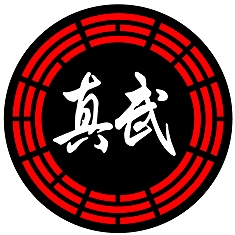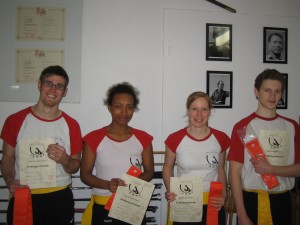Als Antwort oder Erweiterung hat Ken (ebenfalls aus der Gruppe von Mike Martello Sifu in Belgien) folgendes geschrieben:
Greetings!
Please allow me to give you all a few insides of my culture (a. as a Chinese and b. having 2 uncles who are kungfu practitioners):
For Chinese people, respect towards your parents is extremely important because they are the ones who gave birth to you, work hard to raise you, feed you and help you for gaining a better future than them. The respect towards a kungfu teacher is no difference, the Chinese word „sifu“ litterally means: teacher and father. It is in true Chinese tradition that the kungfu teacher gives you the knowlegde to gain high level which he has gone through many hardships in order to pocess this skill himself. But for a really good teacher, not only is it important to see his student grow skillwise, but also to see them becomming a true person. This „true-ness“ means beyond todays material gain and selfishness.
For those who wants to train real kungfu, one has to acknowledge 2 important points:
1) in training, there is no short cut. All good martial artists have done only 1 or 2 excercises for one or two years. After that, it is the teacher who tells who is ready to move on and who is not. A bad teacher will let you do anything for the money and you will leave with terrible bad skill.
2) second point: there is no such thing as training kungfu without showing the respect to your teacher and your kungfu brothers and sisters and your parents. This is the culture behind kungfu and if you don’t agree with it, you will NEVER understand kungfu. Period
I know there will be some change in the training, what Mike laoshu wants is to match his method of teaching with the quality of his kungfu. Here is the bad news: there is no short cut. And the good news? We get to train „real“ kungfu.
Here are some general understanding from the Chinese kungfu practitioners:
1) before training, greet your teacher, regardless you are late or on time. Same for when you are leaving. If you have to leave early, ask your teacher first. This is basic respect in every culture!
Also: don’t enter the class with your hands in your pockets.
2) Put it in your head: you have to train 1 or 2 years basics (e.g. mabou and first movement of tantui (turn waist to block and punch)) for one or two hours! PERIOD (I am happy to join this training with you)
3) when the teacher explains something, don’t try to copy his move straight away. but WATCH FIRST.
Most mistake students make is to try the move before the teacher has finished and during the try out the student’s eye are on himself or on the ground.
4) Some students take many breakes during the excercises, if you haven’t trained for at least an hour, don’t take a break yet. (and don’t stop with every excercise to rest and watch the rest) When Mike Laoshi is teaching, let him decide for a break.
5) respect your kungfu brother, don’t say things as „I don’t want to learn from you“ as this is disrespectful. We can all learn from eachother, both the correct and incorrect moves. Be open to share with your kungfu brothers and sisters.
6) there is no such thing as „warming up“, what Mike Laoshi teaches the first hour is the root of all good kungfu and it is called „basics“. Without that you have no kungfu.
7) don’t ask the teacher to teach what you want, only he can decide when you are ready to do something else
8) RESPECT your teacher, if you don’t, why would he teach you?
Anyone who wants to share their view are welcome. We all want good quality training, so all suggestion are welcome.
For those who thinks this is hard, when I was in japan and attended Saito’s son aikido classes; all the students has to kneel and bow with their head against the ground when the teacher arrives, only when he said so we were allowed to raise our head and look at him. Even in Western boxing, the students have to respect their teacher.
ok, see you boys and girls at the training!!!!!



Danke schön, Ken!! Für uns westlichen Leute ist es eine andere Welt und diese zu beleuchten ist dir gelungen. so können wir unbeabsichtigtes falsches Verhalten beim nächsten Mal schon besser verhindern.